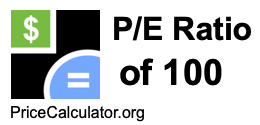
Here we will explain how a price-to-earnings (P/E) ratio of 100 is calculated and what it means in terms of valuation.
P/E ratio is calculated by dividing a company's market value per share by a company's earnings per share (EPS). Thus, a P/E ratio of 100 means that one company's share is trading at 100 times the company's earnings per share.
A stock with a P/E ratio of 100 is often considered an overvalued stock. A P/E ratio of 100 often indicates that the stock is priced high relative to its earnings. This can be due to high growth expectations or market hype. While it might suggest strong future performance, it also carries the risk of being in a bubble. Investors should proceed with caution and consider the sustainability of stocks with a P/E ratio of 100.
P/E Ratio Meaning
A P/E ratio of 100 is not all we have information about. Enter another P/E Ratio of a stock to see what it could mean!
What does a P/E ratio of 0.01 mean?
Here is more P/E ratio information for you. Check it out!
Contact | Disclaimer | Copyright | Privacy
